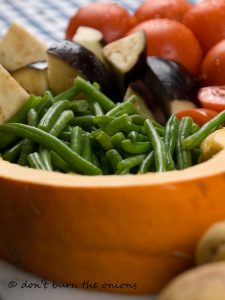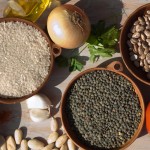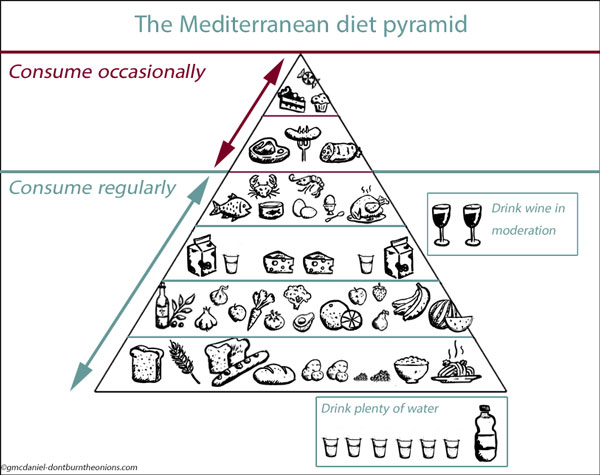
The traditional Mediterranean diet is a great option for those seeking a more healthy diet, to slim down or looking to ameliorate chronic conditions, such as osteoarthritis. And though it may disappoint those looking for the perfect excuse to up sticks and move somewhere warmer, the essence of the Mediterranean diet is easy to follow wherever you live.
What are the scientifically proven benefits?
- general well-being
- weight loss
- increased life expectancy
- reduced risk of developing cardiovascular diseases and cancer
The Mediterranean way of eating also means:
- re-educating your palate to prefer fresh, natural foods.
- achieving the recommended “5 a day” with little effort.
- learning the art of cooking delicious meals from scratch.
- learning creative uses for cheaper ingredients like dried beans, store cupboard staples and leftovers.
- eating satisfying meals so less temptation to graze on junk food.
- saving money but eating better quality food.
- achieving your ideal weight and maintaining it long-term.
7 steps to a healthy diet:
- Have more olive oil and other natural vegetable oils in cooking, salads, dips and spreads.

Include in your daily diet
For more information on the different types of olive oil and health benefits click on Glossary.
Click on recipes for lots of ideas on using olive oil in your food.

Eat daily
2. Have garlic every day, either raw or cooked and in salads, dips and snacks. The recommended amount is 5 cloves a day; this may sound like a lot but there are so many tasty ways to use it – such as in Greek dips, Spanish tapas, on bread with olive oil instead of butter, in salad dressings, roasted with chicken or meat, in soups and sauces.

Eat at least 5 portions a day
3. Eat more vegetables and fruit. A good way to eat more vegetables is to use them in all vegetable dishes such as Aubergine Parmigiani or Layered Vegetable Bake. For more ideas click on Vegetarian Recipes. Fresh seasonal products are better to eat than processed products as they contain more fibre, vitamins and minerals .

Include in your daily diet
4. Eat more grains, pulses, seeds and nuts such as bread, rice, couscous, lentils,chickpeas, haricot beans, almonds, walnuts, sesame seeds-to name but a few. The variety is enormous and all are a good source of protein, fibre and healthy fats. For a balanced diet integrate these into your weekly menu plan. See recipes for ideas.

Eat fish once or twice a week
5. Eat more fresh fish and chicken than red meat. Fish and shellfish are low in calories and high in Omega 3 fatty acids which are essential for joint health. Chicken is considered healthier than red meat due to its lower fat content but free range is preferable, not just for taste and texture but for its nutritional content.

Eat every day
6. Include small daily helpings of low-fat or non fat dairy products such as yoghurt and cheese such as mozzarella as these are important for calcium and protein. Buy plain yoghurt and sweeten by adding fresh fruit or honey like they do in Greece. Eggs as an alternative to fish or meat can be eaten 3 to 4 times a week.
 7. Ensure you drink plenty of water. In the traditional Mediterranean diet, a moderate amount of wine was drank daily and there has been much scientific debate about whether this is desirable as part of a modern diet. The choice is yours. But do remember that in countries where wine is still drank every day, it is consumed in moderation (about one to two glasses each day for men and one for women) and always as part of a meal.
7. Ensure you drink plenty of water. In the traditional Mediterranean diet, a moderate amount of wine was drank daily and there has been much scientific debate about whether this is desirable as part of a modern diet. The choice is yours. But do remember that in countries where wine is still drank every day, it is consumed in moderation (about one to two glasses each day for men and one for women) and always as part of a meal.
Eat less:
- red meat
- butter and foods containing high amounts of saturated fats
- processed foods like sausages, ready meals and take aways
- sugary pastries, puddings, cakes and sweets
The Mediterranean Diet Pyramid
The food pyramid below provides a visual reference to the types and quantities of foods recommended in the traditional Mediterranean diet. The foods represented by icons in the lower part of the pyramid should be consumed in greater quantities and with greater frequency than the foods higher up the pyramid.

Did you know that:
- in the Mediterranean they eat more than a pound of fresh salads and vegetables a day?
- eating fresh fruit and vegetables daily can help to combat the signs of ageing?
- most of us do not get enough Vitamin D in the UK due to insufficient hours of sunshine?

Please note the information provided in this post is given as a general guide only and is in no way intended to replace medical or professional nutrition advice. Please consult a doctor before starting any new diet or exercise regime.
© (Suzette McDaniel Don’t Burn The Onions) Unauthorized use and /or duplication of this material without express written consent from this blog’s author/and or owner is strictly prohibited.
For lots of ideas and inspiration on ways to include these foods in your weekly diet, click on Recipes.

You must be logged in to post a comment.